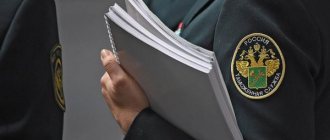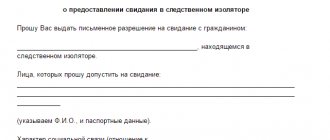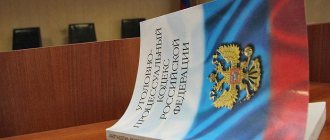New edition of Art. 223 Code of Criminal Procedure of the Russian Federation
1. A preliminary investigation in the form of an inquiry is carried out in the manner established by Chapters 21, 22 and 24 - 29 of this Code, with the exceptions provided for by this chapter.
2. An inquiry is carried out in criminal cases specified in part three of Article 150 of this Code.
3. The inquiry is carried out within 30 days from the date of initiation of the criminal case. If necessary, this period can be extended by the prosecutor to 30 days.
3.1. A suspended inquiry may be resumed on the basis of a decision of the prosecutor or the head of the inquiry unit in the cases provided for in Article 211 of this Code.
3.2. Having recognized the decision to suspend the investigation of a criminal case as illegal or unfounded, the prosecutor, no later than 5 days from the moment of receiving the materials of the criminal case, cancels it, about which he issues a reasoned resolution outlining the specific circumstances to be investigated, which, together with the materials of the criminal case, immediately sends head of the investigation agency. In this case, if the period for inquiry expires, the prosecutor sets a period for additional inquiry of no more than 10 days. Further extension of the period of inquiry is carried out on a general basis in the manner established by parts three, four and five of this article.
3.3. Having recognized the decision to suspend the investigation in a criminal case as unfounded, the head of the inquiry unit issues a reasoned resolution to cancel it and resume the investigation, and if the grounds specified in paragraphs 1 and 2 of part one of Article 211 of this Code arise, to resume it. If necessary, the period for additional inquiry is set by the prosecutor up to 10 days based on a petition from the head of the inquiry unit. Further extension of the period of inquiry is carried out on a general basis in the manner established by parts three, four and five of this article.
4. In necessary cases, including those related to the conduct of a forensic examination, the period of inquiry provided for in part three of this article may be extended by district or city prosecutors, a military prosecutor equivalent to them and their deputies up to 6 months.
5. In exceptional cases related to the execution of a request for legal assistance sent in the manner prescribed by Article 453 of this Code, the period of inquiry may be extended by the prosecutor of a constituent entity of the Russian Federation and an equivalent military prosecutor to 12 months.
6. Resumption of a suspended inquiry or extension of the period of inquiry in criminal cases being processed by an investigator of the Investigative Committee of the Russian Federation is carried out by the appropriate head of the investigative body of the Investigative Committee of the Russian Federation in the manner established by parts three to five of this article.
Inquiry: essence of the procedure, characteristic features
Inquiry is one of the forms of preliminary investigation in criminal proceedings. In essence, this procedure is a method of preliminary investigation conducted in an expedited manner. As a rule, it is applied to simple criminal cases. We are talking about cases of crimes - criminal offenses - characterized by low or, alternatively, medium severity.
Cases under investigation
Thus, a preliminary investigation can be carried out as an inquiry if the relevant authorities are considering criminal cases for the following offenses (crimes) stipulated by the Criminal Code of the Russian Federation (CC):
- intentionally causing harm to the health of another person, if this harm is considered minor or is characterized by moderate severity;
- beating or torturing another person;
- involvement of a minor in the commission of a criminal offense;
- intentional damage (destruction) of property belonging to another person;
- other criminal offenses specified in part 3 of article 150 of the Code of Criminal Procedure.
Characteristics of the investigation process
Procedural measures and investigative actions implemented during an inquiry are similar to those actions carried out as part of a preliminary investigation - another form of preliminary investigation. However, the inquiry is still characterized by some specifics:
- carried out by the relevant authorities specified in the content of Article 40 of the Code of Criminal Procedure. These may be internal affairs bodies, other authorized divisions (services) of the executive branch, the Federal Bailiff Service, State Supervision Service, as well as senior officials of the armed forces. In addition, such bodies may be heads of diplomatic missions, captains of sea vessels, as well as other persons (within the agreed competence);
- the necessary actions are carried out by the investigator or, alternatively, by a group of investigators. The process is led by a person who has the authority of the head of the department (body) of inquiry in accordance with Articles 40.1, 40.2 of the Code of Criminal Procedure. The powers of the investigator are regulated by Article 41 of the Code of Criminal Procedure. The prosecutor, within the limits of his competence, defined in Article 37 of the Code of Criminal Procedure, supervises the conduct of the inquiry, and also gives the necessary instructions to the investigator;
- this procedure is regulated by Chapter 32 of the Code of Criminal Procedure;
- the deadlines for completion, extension of deadlines and the procedure for carrying out this procedure are regulated by Article 223 of the Code of Criminal Procedure. The typical period for completing it is 30 days. The period is extended by the prosecutor for another 30 days if such a need arises. If necessary, the inquiry may be suspended, and it will be resumed in the manner specified in parts 3.1, 3.2, 3.3 and 6 of the same article;
- a subject who, by way of inquiry, is brought to proper criminal liability, is considered a suspect, which is confirmed by a written notification. Such a notice is issued and handed to the suspect in accordance with the provisions of Article 223.1 of the Code of Criminal Procedure;
- Article 224 of the Code of Criminal Procedure determines the possibility of taking a suspect into custody as part of the investigation. This norm stipulates the specifics of assigning this preventive measure to a suspect. It is appointed by the court at the request of the investigator. To file such a petition, you must obtain the consent of the prosecutor.
General procedure for the investigation
Thus, the general (standard) order of inquiry is as follows:
- A criminal case is initiated by an authorized body, that is, an investigator.
- The suspect is apprehended and subsequently arrested.
- The necessary procedural (investigative) actions are carried out, within the framework of which the suspect is interrogated.
- The final stage is the filing of an indictment. In this case, all prepared and collected materials are provided to the authorized prosecutor. As a result, the suspect acquires the status of an accused, and his case is considered by the judicial authority.
Completion of the inquiry
The inquiry ends with the drawing up of an indictment . This document can be compared with a resolution to bring a person as an accused during the preliminary investigation, but formally it has much in common with an indictment.
An indictment is drawn up within 30 days from the date of initiation of a criminal case or within 10 days from the date of arrest (detention) of the suspect. Or within 60 days, if the inquiry period was extended. Requirements for the indictment – Art. 225 Code of Criminal Procedure of the Russian Federation. After its preparation, the investigator presents the document to the now accused and his defense attorney, who simultaneously become familiar with both the act and the materials of the criminal case. If the victim filed a petition, then the indictment and case materials are also presented to him for review.
After completing the procedure for familiarizing yourself with the case, the investigator sends the materials to the prosecutor for approval of the act and sending the case to court.
Download the indictment of the inquiry (form/sample)
Initiation of a case
If a criminal case has already been initiated, and a specific subject is brought to justice, this subject is immediately considered a suspect. If the case was initiated on the basis of the fact of an offense, and the suspect in this case was identified later, this person must be notified in the prescribed manner:
- Proper written notice is correctly executed by the inquiry officer. A copy of such paper is given to the suspected subject, and another copy is sent to the prosecutor. At the same time, the investigator himself clearly explains to the suspect his rights. These actions of the investigator are documented in a protocol containing a note indicating the delivery of a copy of this notice.
- For 3 days, counted from the moment of provision of such notification, the subject having the status of a suspect is interrogated by the investigator. A similar rule applies if there are several suspects in a particular case (each of these subjects is issued a separate notification).
Bodies of inquiry and their powers
- The suspect acquires the status of an accused after drawing up the final act;
- actions to obtain evidence such as seizure of correspondence and billing requests are not carried out;
- During the investigation process, it is impossible to conclude a cooperation agreement.
Chapter 32.1 of the Code of Criminal Procedure of the Russian Federation stipulates a shortened procedure for conducting an inquiry, in which the investigator is practically freed from collecting and checking evidence.
According to the Code of Criminal Procedure of the Russian Federation, an inquiry takes place only in the investigation of criminal offenses of minor and medium gravity, and in a special order - in the presence of an admission of guilt, taking into account all the circumstances, as well as the consent of both parties - the victim and the suspect.
- Internal Affairs of the Russian Federation.
- Border units of the FSB of the Russian Federation.
- Bailiffs Service.
- State fire supervision.
- Customs Service.
Inquiries into cases of crimes involving law enforcement officers and certain other categories of citizens are within the competence of investigators of the Investigative Committee of the Russian Federation.
The legislator included among the powers of investigators the conduct of both direct investigations of criminal offenses of minor gravity, and urgent procedural actions in cases in which an investigation is established in the form of a preliminary investigation. The Code of Criminal Procedure of the Russian Federation also gives the right to carry out procedural actions, including initiating a case, to heads of diplomatic and consular institutions, heads of wintering grounds and other scientific field bases, captains of long-distance ships, if a crime is recorded within the territories subordinate to them.
Conditions under which an inquiry can be conducted in an abbreviated form
An inquiry in an abbreviated form is carried out only at the written request of a suspect in a criminal case.
To satisfy this request of the suspect, the following conditions must be met:
1. a criminal case has been initiated against a specific suspect;
2. the suspect admits his guilt in the crime, does not dispute the classification of the crime, which is indicated in the decision to initiate a criminal case, and does not dispute the nature and extent of the damage caused by him;
3. there are no circumstances excluding the conduct of an inquiry in an abbreviated form listed in the law, namely:
- the suspect reached the age of majority at the time of the crime;
- there are no grounds for applying compulsory medical measures against the perpetrator;
- the suspect does not belong to the category of persons whose criminal cases are considered in a special manner;
- a person is suspected of committing crimes that are investigated in the form of an inquiry;
- the suspect speaks Russian and does not need the services of an interpreter;
- the suspect himself consciously requests an inquiry to be conducted in an abbreviated form.
The procedure for conducting an inquiry in an abbreviated form
Before the first interrogation of the suspect, the interrogating officer explains to the latter the right to submit a request to conduct an inquiry in an abbreviated form. A note about this is made in the protocol of interrogation of the suspect. Within two days from the moment of clarification of the right to submit a petition, the suspect has the right to submit such a petition in writing. It must be signed by the suspect and his defense attorney.
Thus, the participation of the defense attorney during the conduct of the inquiry in an abbreviated form is mandatory.
The investigator must resolve the received written petition within no more than 24 hours from the moment of its submission. Having considered the said petition, the investigator must resolve it by issuing a decision to satisfy or refuse to satisfy it. The investigator notifies the prosecutor of the satisfaction of the request within 24 hours. In addition, the investigator makes a decision to conduct the inquiry in an abbreviated form.
The suspect, his defense attorney and the victim have the right to appeal this decision to the prosecutor or to the court.
If the investigator has granted the suspect’s request to conduct an inquiry in a shortened manner, he carries out investigative actions sufficient to establish the event of the crime, the amount of damage caused, as well as the guilt of the suspect. Thus, the investigator carries out only those investigative actions that are necessary and sufficient to establish the existence of a crime, the nature and extent of the damage caused, as well as the guilt of the suspect in committing the charged crime.
The investigator has the right:
- do not check evidence if it is not disputed by the suspect, his defense attorney and the victim or his representative.
- do not interrogate persons who were interrogated during the preliminary verification of a report of a crime, unless there is a need to clarify or establish additional information;
— do not order a forensic examination on questions that are answered in the expert’s report.
If the specialist’s conclusion does not contain answers to all the necessary questions, the specialist’s conclusions are called into question by any of the parties to the case; an examination is carried out during an abbreviated inquiry.
An examination is appointed by the investigator also in cases where it is required by law.
- not to carry out other investigative actions aimed at establishing the circumstances that were established by the preliminary inspection materials.
Hence, during the inquiry, in an abbreviated form, preliminary verification materials obtained through non-procedural means are used as admissible evidence.
An inquiry in an abbreviated form must be conducted within no more than 15 days from the moment the suspect’s request to conduct an inquiry in an abbreviated form is satisfied before the criminal case is sent to the prosecutor with an indictment.
The period of inquiry in a shortened form may be extended by the prosecutor to 20 days. The suspect and his defense attorney and the victim and his representative are notified of the extension of the investigation period.
After collecting evidence in accordance with the requirements of the Code of Criminal Procedure, sufficient to confirm the guilt of the suspect, the investigator draws up an indictment, which sets out essentially the same circumstances as in the indictment drawn up at the end of the inquiry in the general manner. This resolution is signed by the investigator and the head of the investigation department.
This resolution must be drawn up no later than 10 days from the date of the decision to conduct an inquiry in an abbreviated form.
After drawing up the indictment, within three days the investigator familiarizes the accused and his defense attorney with the indictment and all the materials of the criminal case. An appropriate protocol on familiarization is drawn up. If the victim and his representatives apply for familiarization with the indictment and materials of the criminal case. If there is a request from the victim and (or) his representative, these persons familiarize themselves with the indictment and materials of the criminal case within the same period, as indicated in the protocol of familiarization of participants in criminal proceedings with the materials the criminal case is also noted. If it is impossible to complete familiarization with the case within the period established by law, the inquiry is conducted in accordance with the general procedure.
If the parties have not received requests to declare the evidence inadmissible or to carry out other investigative actions, the investigator immediately forwards the criminal case to the prosecutor.
After checking the criminal case, the prosecutor makes a decision:
— on approval of the indictment;
-on the return of the criminal case to re-draft the indictment;
-on conducting an inquiry in the general manner;
- about the termination of the criminal case.
After the indictment is approved, a copy of it is handed over to the accused, defense attorney, victim or representative, and the criminal case is sent to court. The named persons are notified about this.







